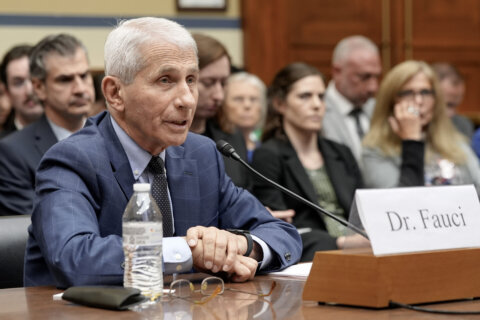WASHINGTON — More scientists agree that the nasal spray flu vaccine is not effective prevention against the influenza virus.
Tuesday, the American Academy of Pediatrics echoed previously released findings from the U.S. Centers for Disease Control and Prevention, and will not recommend the FluMist this year — a stunning development for the flu vaccine alternative that was once thought to be more effective than the flu shot.
FluMist was a popular option for families who preferred a less painful approach, but the nasal spray vaccine was less effective than flu shots during the past three flu seasons.
The nasal spray was first approved by the FDA and introduced to the public in 2003. The vaccine delivers a live, weakened flu virus through the nose and was available to healthy people ages 5 to 49 years old. It was touted as a safe alternative to an injectable vaccine and was even named one of the “Best Inventions of 2003″ by Time Magazine.
At the time, FDA studies showed that the nasal spray reduced the cases of influenza illness by 93 percent of healthy children and 85 percent of healthy adults compared to a placebo.
In 2007, the FDA updated its recommendation and expanded FluMist approval to younger children. That year, the vaccine showed a 55 percent greater efficacy in children compared to a flu shot.
The FluMist Quadrivalent vaccine, licensed in 2012, replaced the original trivalent version. But despite covering more strains of the flu, the nasal spray has become less and less effective.
“We do these evaluations of the effectiveness of vaccines on an annual basis and it appears actually for the last three years that the FluMist has been substantially less effective than the injectable vaccine. For a variety of reasons, all of this has come to a head this year,” said Dr. William Schaffner, an infectious disease specialist at Vanderbilt Medical Center.
In June, the CDC’s Advisory Committee on Immunization Practices voted to not recommend the nasal spray vaccine because data showed “poor or relatively lower effectiveness” from 2013 to 2016. Preliminary data from last flu season showed a 3 percent efficacy rate in children ages 2 to 17 years.
“This 3 percent estimate means no protective benefit could be measured,” the CDC said in a statement.
Meanwhile, the flu shot showed 63 percent effectiveness against the flu in children.
Schaffner says he’s concerned that parents who preferred the FluMist for their children, or who may be ambivalent about the vaccine in general, might resist getting the flu shot. Choosing not to vaccinate could lead to serious illness or death.
“Flu can be devastating, even to a normal, healthy child. It can put that child in the intensive care unit in 48 hours and no parent wants that,” Schaffner said. “Every pediatrician in the country is going to be urging all the parents to bring in all the children to be vaccinated.”
Adults are not immune either.
“I have seen too many children and too many adults become sick, literally unto death, because of this fierce viral infection,” he said.
It’s not clear why the efficacy has diminished over the years but Schaffner said he hopes the nasal spray can be improved so that it can be an alternative for families once again.
“The flu vaccine is not a perfect vaccine but it’s the best prevention that we have against this serious infection.”
Schaffner said MedImmune LLC, a subsidiary of AstraZeneca and the Gaithersburg company that manufactures FluMist, may continue to sell a limited number of doses in the United States, but there is still a large demand overseas where studies show the vaccine has worked better.
“That’s part of the scientific conundrum that we’re all trying to figure out,” he said.
The CDC recommends the flu vaccine for most people 6 months of age or older, especially those who are most at risk like children and the elderly.





